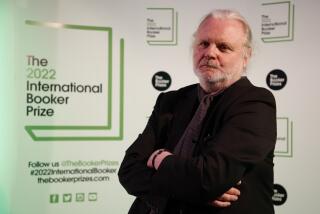Economist Dies 3 Days After Winning Nobel
- Share via
NEW YORK — Three days after being awarded the Nobel Memorial Prize in economics for his inspired and imaginative solutions to the problems of everyday life, William S. Vickrey died of an apparent heart attack Friday at age 82.
Colleagues at Columbia University here, where Vickrey’s career spanned 60 years, were stunned and saddened by his death, which came just as he was finally gaining a worldwide audience for his provocative views. After being named co-winner of the honor Tuesday, Vickrey said the primary goal of his life would be to use the new “bully pulpit” to trumpet his latest idea: boosting the federal deficit to cut joblessness.
The Canadian-born economist was found unconscious and slumped over the wheel of his car by a passing motorist on the Hutchinson Parkway about 30 miles north of New York City late Thursday night, according to police.
He was taken by ambulance to a hospital in nearby White Plains, where he was pronounced dead early Friday morning of an apparent heart attack. Vickrey had been en route to an academic conference in Boston, police said.
Tuesday’s announcement by the Royal Swedish Academy of Sciences had plunged Vickrey into a whirlwind of activity as he became an instant object of media attention. Although his work was well-known within economic circles, Vickrey was far from a household name.
Colleagues declined to speculate on whether the unaccustomed swirl of interviews and acclaim had placed him under strain. They said he had showed no signs of ill health and had been hale and ebullient when the Columbia Economics Department feted him with a congratulatory party this week.
“We would have loved to see him in a tuxedo in Stockholm accepting his award,” said Padma Desai, a Columbia economist whose office has been adjacent to Vickrey’s for the last 10 years.
The prospect of seeing Vickrey--a very casual dresser--in formal attire was nearly as attractive as that of hearing his latest thoughts, said Desai, who regarded Vickrey as “a rare combination of pure genius and pure humanity.”
“When asked the significance of becoming a Nobel laureate, Bill Vickrey characteristically answered that it would give his ideas a better hearing,” Columbia President George Rupp said in a statement Friday.
“It is our hope that the work of this dedicated and important scholar will continue to be given the worldwide attention it attracted this week.”
His colleagues said they are glad that he lived long enough to win the honor. The prize is not awarded posthumously.
Vickrey shared the prize and its cash award of $1.12 million with economist James A. Mirrlees of Trinity College in Cambridge, England, for their separate work in the field of “asymmetric information,” exploring how people can make better decisions despite incomplete information.
Vickrey’s contributions included an ingenious method of holding an auction to improve the chances of a fair price for both buyer and seller. He also offered ways of using off-peak pricing to promote efficient use of electricity and ease congestion on highways and public transportation lines.
His latest enthusiasm was combating what he thought had become an “obsession” with some politicians and economic commentators: eliminating the federal deficit.
A follower of British economist John Maynard Keynes, Vickrey believed that the government should instead be allowing the deficit to grow in order to boost purchasing power and cut unemployment, which he regarded as a far greater problem.
Such comments, in an interview with Reuters after the Nobel prize announcement, drew a scathing rebuttal from House Speaker Newt Gingrich (R-Ga.), who said, “Now we know that he is an obsolete socialist, representing all the values that collapsed with the Berlin Wall.”
*
Donald Dewey, a retired economist who was Vickrey’s colleague for 30 years at Columbia and his neighbor in suburban Hastings-on-Hudson, said that for all of Vickrey’s interest in public transportation, he traveled to work and nearly everywhere else by car.
“His argument was that he believed in public transportation but [that] until it got reformed along the lines he suggested, he was driving,” Dewey said.
An enemy of inefficiency, Vickrey experimented with side streets and throughways until he had pared his approximately six-mile commute to 20 minutes, Dewey said.
His interests varied widely, and he would attend seminars on subjects ranging from microbiology to ancient Egyptian tombs. Dewey said he liked to listen with his eyes shut and that just when he appeared to have nodded off, he would toss off a penetrating question.
Vickrey, a naturalized U.S. citizen who was born in Victoria, British Columbia, grew up in New York, Switzerland and New Jersey and studied mathematics at Yale. He earned a master’s degree in economics from Columbia in 1937 and a doctorate in 1948.
He is survived by his wife of 45 years, Cecile.
More to Read
Sign up for Essential California
The most important California stories and recommendations in your inbox every morning.
You may occasionally receive promotional content from the Los Angeles Times.










